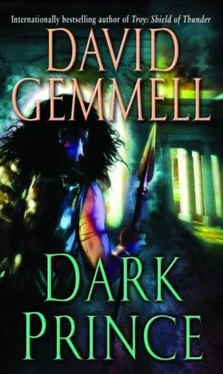The enemy were closing fast and Cleander could see sunlight glistening on helms and lances. There were thousands of horsemen galloping towards the city and fear leapt in the Spartan's heart. Could they hold off so many?
'Father Zeus, give me strength,' he prayed. He glanced up at Dorian. 'Get down, boy, and be ready at my signal.'
Three men now joined them on the roof-top. Two carried bows and several quivers of longshafted arrows; the third placed himself beside the twenty iron-pointed javelins resting against the parapet. The javeliner hefted the first weapon, testing it for weight and balance. 'Not. . until. . the signal,' warned Cleander and the man nodded and smiled.
I was a warrior once, thought Cleander. With helm and sword I would have been standing alongside my King, cutting down his enemies and glorying in my strength and power. Another spasm of coughing tore at his skeletal frame. Bright lights danced before his eyes and he felt himself slipping sideways. Dorian seized him, holding him upright. Cleander's vision was blurring, darkness closing in on him. With a supreme effort of will he fought it back, concentrating on the galloping cavalry. He saw the force separate and watched half of the riders thunder towards Leaving Street.
In the distant past Sparta had boasted a strong wall but Lycurgus, the legendary founder of the warrior creed, had told them that a wall of men was stronger than a wall of stone, and the city's defences had been torn down. Such was the pride of Sparta, such was the strength of their army that at no time in their history had an enemy ever come close enough to threaten the city.
Until now…
As the cavalry swept along Leaving Street Dorian looked to Cleander, but the dying man shook his head. On they came, their white cloaks streaming out behind them. Many of the cavalry were Korinthians and wore little armour, carrying only lance or sword, their protection lying in the speed of their mounts and the small buckler shields strapped to their left forearms. Cleander waited until they were almost to the end of Leaving Street, the column strung out below him. 'Now!' he whispered.
A long blast blew from the horn and men rose up on every roof-top, javelins slashing through the air in a dark rain of death that ripped into the invaders' ranks. Horses went down in their hundreds, spilling riders to the cobbled street.
Then bowmen began to rake the survivors, who had nowhere to run. White cloaks and tunics blossomed with crimson stains and the screams of dying men echoed through the city. Oleander watched the slaughter dispassionately, then turned to see the vanguard of the column riding into the agora. Here they were met with a storm of missiles.
Armed slaves clambered over the barricades and charged into the demoralized invaders, dragging them from their mounts, sharp knives and hatchets ripping and cleaving into flesh and bone.
The routed cavalry fought to escape, but the only route was back the way they had come and the streets were choked with dead horses and men.
And the slaughter continued.
Cleander sagged back to the roof-top.
His vision darkened, the men around him fading and becoming shadows. Then a bright figure stepped into view, seeming to emerge from a glistening mist. Cleander rose, all pain vanishing, and looked into the eyes of the shining man before him.
'I did not let you down, sire. The city is safe.'
'You did well, cousin,' said Parmenion, King of Sparta. Cleander gazed down upon his own frail body, lying forgotten as the fighting raged on. So thin and wretched… it was such a pleasure to be free of it. Then despair touched him. If the King was here, then. .
'Did we lose, sire?'
'Not yet. The battle continues. Come, follow me.'
'I always have, sire. I always will. But where are we going?'
'To the Field of Blood, my friend. For there are many Spartans there who will need a guide before this day is over.'
Despite the carnage on either side Parmenion felt detached from the battle, his mind focused entirely on the feel of the conflict. The Makedones had suffered a terrible reverse; their mercenaries, cut down in their hundreds, were on the verge of panic. Some were already running back, fleeing the combat. The Regulars were still fighting hard despite appalling losses, but they were being forced back by the savage skills of the disguised Spartans.
The battle was not yet won or lost, but balancing on a knife-edge. He looked to his right, where Leonidas and Timasion were leading the assault. The Spartans had formed a fighting line 200 shields wide, and they were gradually turning the enemy back towards the centre of the field. On the left Learchus was no longer making headway, the ground beneath his warriors covered with the bodies of the fallen.
Dust was billowing across the battlefield as Parmenion transferred his gaze to the enemy reserves, the elite Makedones Guards. He blinked and narrowed his eyes.
They were advancing.
Cold fear swept through him. Next to the Spartans these were the most disciplined fighting men of Achaea, victors of a score of major battles. On they came, a solid phalanx of fighting men in tight formation, twenty ranks at least. The combined weight of their charge would carry them deep into any stationary enemy line.
Parmenion silently swore. Had his troops been truly Spartan he would now sound the advance, moving out to meet the enemy head-on, matching their formation and relying on the strength of his soldiers to withstand the charge. But they were not Spartans: they were house-slaves, messengers, gardeners and servants, with no experience of war.
In that dread moment a sudden realization struck him: he had no choice. If they stood still they would be swept aside.
Spartans or no, the strategos was left with only one option.
Attack.
Curiously this thought swept away all his fears, and from some deep well of his being rose a savage lust for battle he had never before experienced.
'Attack formation!' he yelled.
The slaves had learned only two manoeuvres during their few days of training and this had been one, moving smoothly from a wide defensive line into a compact attacking unit.
'Drummers sound the beat!' shouted the King. 'By the step three!'
Behind the battle-lines the ten drummers began to mark the time with a steady, rhythmic pounding.
Parmenion eased himself into the third rank as the men began to march forward to meet the enemy. The first rank carried shield and sword, the men in the second wielding long iron-pointed spears. Once close to the enemy these weapons would be lowered, the men in the front line sheathing their swords and helping to guide the spears home while the wielders, gripping the hafts with both hands, rammed them into the opposing ranks.
Against an ill-disciplined force, or troops without formation, such a tactic was often decisive. But, in the main, close-order troops would block the spears with their shields and the initial stages of combat would be down to the strength and weight of the two phalanxes as they clashed, like two huge bulls coming together head to head.
'Level spears!' bellowed Parmenion and the weapons came down in a ragged line, but the billowing dust prevented the enemy from seeing clearly how inexpertly the spears were brought into position. 'Drummers by the step four!'
The beat quickened, like the thudding of an angry heart.
'Now we will show them,' said Priastes, moving alongside his King. But Parmenion had no time to answer, for the enemy were close.
The Makedones were not moving as fast as he had expected. In fact they seemed hesitant, their line curving — wider at the flanks, concave at the centre. For a moment Parmenion was nonplussed, then realization came to him.
Читать дальше












